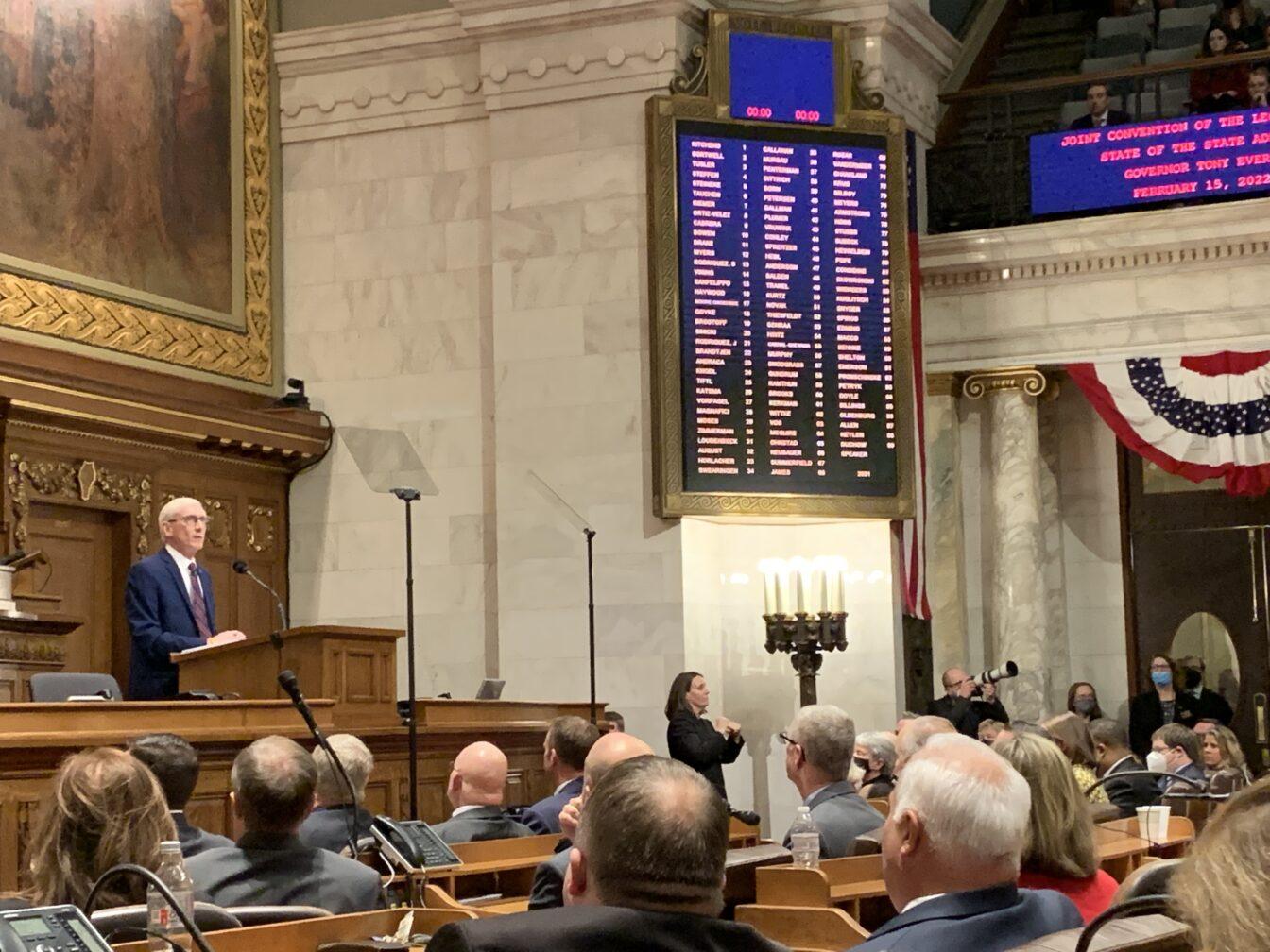Wisconsin Gov. Tony Evers announced his state budget proposal for the 2023-2025 period Feb. 15, 2023. In this budget, Evers proposed many ideas that will be voted on in the upcoming months. The proposed budget represents a 17.9% increase in annual state spending.
The budget proposal includes a multitude of improvements to healthcare access, mental health and public school education, as well as money for updating roads, bridges and American Family Field. In his address, Evers also proposed spending an additional $2.6 billion on PreK-12 education.
“Our kids can only achieve their full and best potential when they can bring their full and best selves to the classroom,” Evers said.
The proposed education budget would be split between general aid in the education department and expanding the special education department. Evers announced that more than $270 million would also go towards making the “Get Kids Ahead” initiative a permanent program. The Get Kids Ahead initiative aims to expand mental health support for kids in schools by providing funding to build Comprehensive School Mental Health Systems in all Wisconsin public and independent charter schools and districts.
to expand access to school-based mental health support for kids in nearly every school district in the state.
This would be the largest increase in education funding in Wisconsin’s history, according to the budget address.
Increasing the state’s investment in education is particularly important given learning losses due to the COVID-19 pandemic, University of Wisconsin professor of applied economics Andrew Reschovsky said in an email statement to The Badger Herald.
“With a projected decline in the state’s working-age population, pursuing policies aimed at reducing the existing academic achievement gaps, will be particularly important in maintaining economic growth in Wisconsin in the coming decades,” Reschovsky said.
State spending on public education has grown quite slowly over the past decade, Reschovsky said. With statutory limits on school district revenues, schools cannot increase spending per student.
Evers’ proposal would increase state aid to local school districts and enable school districts to utilize the proposed equalization aid increases for additional spending, Reschovsky said.
Evers has also named 2023 the “Year of Mental Health.” With the additional spending abilities, Evers said Wisconsin could reimburse schools for costs associated with expanding access to mental health professionals.
Evers also announced a pilot program to ensure children’s safety in athletic participation in schools. This program will require high school sports programs to provide information about sudden cardiac arrests as well as promote parents getting EKG tests for their children according to the governor’s press release.
This program is an extension of the “Kai 11” bill, which was named after Kai Lermer, a student who died of cardiac arrest due to an undiagnosed heart condition. Evers signed the Kai 11 bill into law Mar. 29, 2022 at Waukesha North High School.
Evers also aims to propose a comprehensive approach to parental leave, with a program that would provide most private sector companies with paid parental leave for 12 weeks. Evers said that paid parental leave and high-quality childcare will set children up for success from the beginning and incentivize workers to stay in the state for employment opportunities.
A large proponent of the proposed budget is the tax cut. Evers is proposing a 10% tax cut for the middle class, with 1.2 billion dollars in tax relief for working families.
This tax cut is seemingly a partisan issue, with many state republicans advocating for a flat income tax, which Evers opposes. The Republicans’ argument that a flat tax will increase economic growth goes against a lot of research that shows it does almost nothing,
“Adopting the Republican proposal would result in a dramatic reduction in state tax revenue followed by large cuts in state spending, including for K-12 education, the UW System and health care,” Reschovsky said. “The proposal would also increase after-tax income inequality, as the largest tax cuts would flow to those state residents with the highest incomes.”
In another tax proposal, Evers wants 20% of Wisconsin’s sales tax to go to local governments to improve public safety initiatives and more. This is part of Evers’ argument that Wisconsin needs to meet the needs of newcomers to attract new residents.
“We cannot expect more people to move here if they have to give up basic freedoms when they do, period,” Evers said.
Evers has proposed the highest level of funding ever in the state to help local communities improve their roads, invest in key projects such as bridges, expand transportation alternatives, and re-engineer roads to improve safety and minimize reckless driving.
Evers also proposes a move to expand BadgerCare Plus — a program that provides healthcare coverage for low-income children, pregnant people and adults in Wisconsin.
Moving forward, the governor’s bill will go to the Joint Finance Committee, where it will be reviewed, and a hearing will be held in the months following. The Joint Finance Committee will edit the budget in May and June and send a bill to the Assembly and Senate, and the Legislature will deliberate and eventually determine the final version of the budget. The governor can then decide on whether to sign, partially veto or entirely veto it.
The Republican majority in the Wisconsin State Legislature has indicated their intention to rewrite their own budget in the coming months, Wisconsin State Rep. Francesca Hong, D-76, said in an email statement to The Badger Herald.
“Gov. Evers has set the needed benchmarks for building a more resilient economy and more thriving communities through this breakthrough budget,” Hong said. “Unfortunately, the GOP majority has indicated their intention to rewrite their own budget in the coming months which will undoubtedly gut the important initiatives that Wisconsinites have asked for and need.”
Wisconsin’s partisan divide was expected to impact discussion surrounding the budget, Hong said.
Evers ended his budget address with a unifying statement.
“These aren’t Republican or Democrat priorities, these are Wisconsin priorities,” Evers said.


